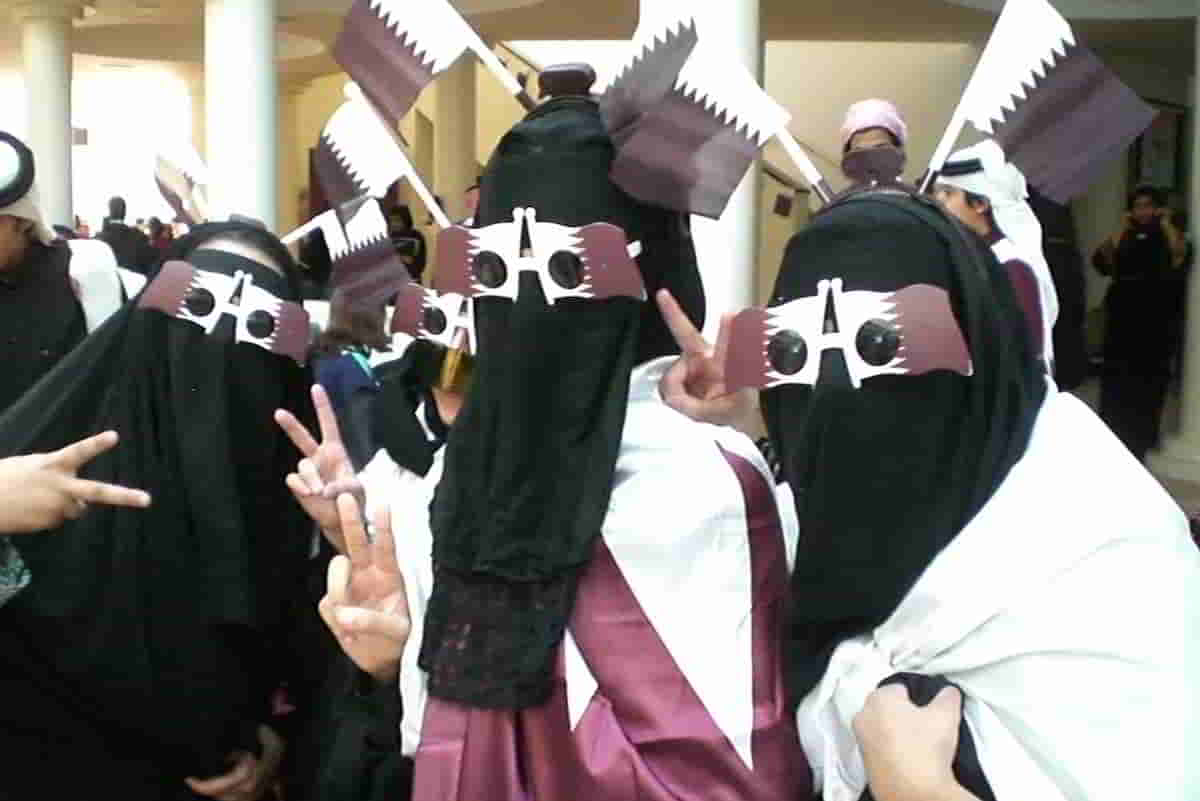
During my short spell as a teacher at Qatar Academy in Doha, Qatar, which ended with my being jailed for allegedly insulting Islam, I saw girls and women in Hijab all the time. Many of those girls were my own students.
BUT, of course, I didn’t have any discussion about it with — nor did I ever even ask any question about it to — any of them.
Reading a Twitter thread a little over a month ago about Hijab by Qasim Rashid on #MuslimWomensDay (March 28), I learned something about Islam that I hadn’t known until then. I reproduce the thread here — with permission from Rashid — to remind myself of this new insight and understanding, and with the hope that it enlightens others as well.
Here it goes.
On #MuslimWomensDay I want to post this thread about Hijab in Islam. This is something I hope every guy reads. /1
— Qasim Rashid, Esq. (@MuslimIQ) March 27, 2017
People often conflate “Hijab” & “headscarf.” Wearing the headscarf is one form of Hijab, but men often forget that Hijab is much more. /2
— Qasim Rashid, Esq. (@MuslimIQ) March 27, 2017
Accordingly, when addressing Hijab, the Qur’an does not address women first. It addresses men first. What? Men observe hijab? Since when? /3
— Qasim Rashid, Esq. (@MuslimIQ) March 27, 2017
Well, since always. The primary responsibility of observing Hijab is not on women — it is on men. It’s critical to understand this point. /4
— Qasim Rashid, Esq. (@MuslimIQ) March 27, 2017
How must men observe Hijab? Men are commanded to not stare at women & to not be promiscuous. The Qur’an commands men to observe modesty. /5 pic.twitter.com/z0xDje6Kc1
— Qasim Rashid, Esq. (@MuslimIQ) March 27, 2017
Verse 24:31 rebukes forced laws on women that say “Women must cover otherwise men are distracted.” This verse destroys rape culture. /6
— Qasim Rashid, Esq. (@MuslimIQ) March 27, 2017
Qur’an commands men,”Don’t stare at women,” demolishing complaints that what she’s wearing is “too provocative,” etc whatever that means. /7
— Qasim Rashid, Esq. (@MuslimIQ) March 27, 2017
Guy: But she’s wearing revealing clothing!
Qur’an: Why are you staring? Stop
Guy: But,it’s revealing
Qur’an: Why—Are—You—Staring?
Guy: :/
/8— Qasim Rashid, Esq. (@MuslimIQ) March 27, 2017
Men have an obligation to God & to women to observe Hijab. It simple. If a guy chooses to accept Islam, Islam says he must observe Hijab. /9
— Qasim Rashid, Esq. (@MuslimIQ) March 27, 2017
Thus Muhammad(sa) rebuked men, “Be chaste yourselves, & women will be chaste as well,” again putting the primary burden of Hijab on men /10
— Qasim Rashid, Esq. (@MuslimIQ) March 27, 2017
This is critical. We’ve all heard guys say “I want a chaste wife,” yet themselves they’re anything but. Do w/e—but dont be a hypocrite /11
— Qasim Rashid, Esq. (@MuslimIQ) March 27, 2017
Once men are thoroughly commanded to observe Hijab by being modest, not staring, & reforming themselves, then the Qur’an addresses women /12
— Qasim Rashid, Esq. (@MuslimIQ) March 27, 2017
Now, many men magically & suddenly discover the concept of Hijab for women—ignoring the primary burden first placed on men /13
— Qasim Rashid, Esq. (@MuslimIQ) March 27, 2017
For some reason men think they can simply force women to observe Hijab. No. Such. Permission. Exists. To. Force. Hijab. In. Islam. /14
— Qasim Rashid, Esq. (@MuslimIQ) March 27, 2017
But as His Holiness the Khalifa of Islam Mirza Masroor Ahmad (aba) reminds men who force Hijab on women — stop & restrain yourselves. /15 pic.twitter.com/M0pXbTd3a4
— Qasim Rashid, Esq. (@MuslimIQ) March 27, 2017
Hijab is a critically important Islamic teaching. No one denies this. But it seems to me that too many men forget it applies to us FIRST /16
— Qasim Rashid, Esq. (@MuslimIQ) March 27, 2017
So that’s my thread on Hijab in Islam. To learn how Hijab applies to Muslim women—I suggest u ask Muslim women
Peace! 17/17#MuslimWomansDay— Qasim Rashid, Esq. (@MuslimIQ) March 27, 2017
He also wrote an article about it. Here it is: Muslim men need to understand that the Quran says they should observe hijab first, not women.
(There is a lesson here for non-Muslims too, a lesson for men in Nepal for instance. Victim blaming when it comes to gender-based violence, such as sexual harassment during festivals, such as Holi, or even something as heinous an act as rape, Nepalese culture allows men to blame the victim.)
Looking back, I find it kind of ironic that, all through my adult life I decide I don’t know enough about the people and religion of the Middle East and that I must actually go live there among them to learn about them, get the opportunity, go there (Qatar), spend almost two years, leave, and I learn more about many aspects of their religion etc. from outside than when I was there!
What do you think?
